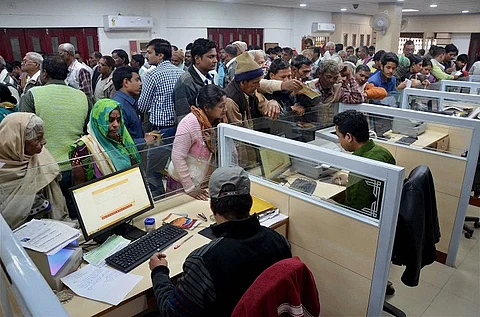

Starting April 1, SBI started restricting free transactions (withdrawal and deposit) and introduced a fine for not maintaining minimum balance in accounts. The bank also limited the number of free ATM transactions a person could do from SBI as well as non-SBI ATMs based on the balance in their accounts.
The move came soon after private banks like ICICI, HDFC and Axis bank announced similar changes. All the changes are highlighted in this Economic Times report. This essentially means that people will now be discouraged from making deposits and withdrawals in cash as well as withdrawing cash from ATMs.
For instance, according to SBI’s new rules, residents of metropolitan cities will be chargeable with Rs 100 plus service tax if the balance in your account falls below 75% of the minimum available balance of Rs 5,000. If it falls by 50% or less, the amount chargeable will be Rs 50 excluding service tax.
On the face of it, it could seem like a move meant to push digital transactions. But Ch Venkatachalam, General Secretary of All India Bank Employees Association, says that bank management have merely clarified to them that this is being done to recover costs from demonetisation and for carrying out certain schemes like Pradhan Mantri Jan Dhan Yojana (PMJDY).
Under the latter, a person can open an account with zero minimum balance, is guaranteed interest on deposit, a RuPay debit card as well as accidental insurance cover of Rs 1 lakh. One of the criticisms of the scheme has been that though populist, it has not really profited the public sector banks mandated to implement it and also added strain to their limited resources.
S Venkateshwar Reddy, General Secretary of the Andhra Pradesh and Telangana Rural Banks Employee Association, says that while the banks complied with the government’s mandate to exchange and deposit old notes, there is little which has been done to reimburse the banks for the expenditure.
“The softwares had to be upgraded, counting machines and ATMs had to be recalibrated, transport had to be arranged to ferry new and old notes. Bank employees also worked for long hours during the process. Now, we are not receiving help from the government to recover the resources exhausted here,” Reddy says.
And while banks may be penalising and imposing costs on customers to fend for themselves, it isn’t right, Reddy adds.
“On one hand, you want to encourage more people to start having bank accounts. On the other hand, you impose such fees. The poor, in rural areas especially, are still getting used to the banking system. This will discourage them from opening new bank accounts too,” he says.
Apart from demonetisation and populist schemes, loan defaulters are also adding to the banks’ growing costs.
While Venkatachalam acknowledges the above reasons, he also says that it is unfair to make the common man bear the brunt of losses the bank is suffering. “Private banks doing this is also wrong but it is especially wrong on the part of a government bank like SBI. Think about people who are poor, how can they maintain Rs 5,000 as their minimum account balance?” he argues.
Jayaram Naik, President of the Karnataka Bank Officers Association, says the banks’ decision is “arbitrary and monopolistic” and reiterated that banks were doing the wrong thing going forward with this move.
Bank management however, does not seem to agree. Speaking to Economic Times, Aditya Puri, Managing Editor of HDFC Bank justified the move. Giving an example, he said in a Rs 10,000 savings bank deposit, the bank has to pay 4% interest and keep 4% as CRR. “I earn around Rs 200 in one year. In this Rs 200, what all you want? Free ATM you want, no cheque book charge you want, no cash handling charge you want?" he argued.
Concerns have been raised earlier about the haphazard way in which banks have gone about in imposing these fees, and different amounts of it. In an opinion piece titled, “It's time to really pull up India's out-of-control banks”, Dhirendra Kumar places the onus on RBI to pull up the banks. Pointing to the lack of uniformity in the way these charges are being levied, he wrote:
“HDFC bank will charge Rs 150 per transaction, someone else is charging Rs 50 while a third bank is charging Rs 5 per Rs 1000. How are these charges arrived upon? Does it make sense for them to be pro-rata? Does the Reserve bank have any idea about these charges?”